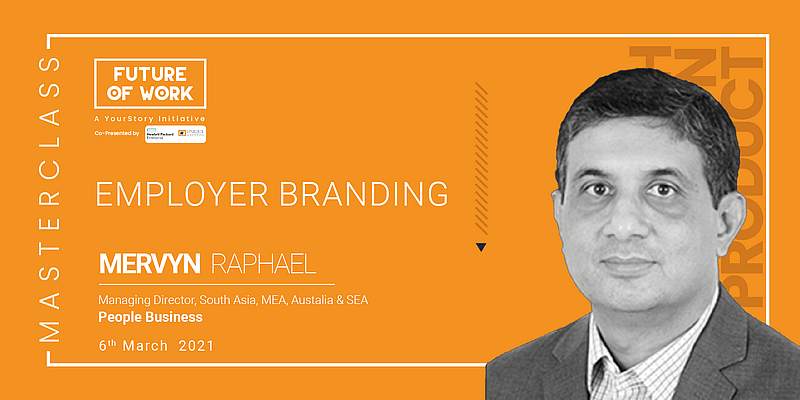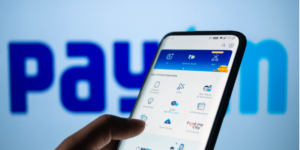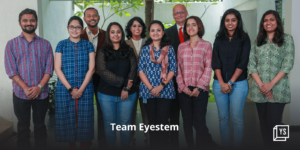Misinformation in the digital age has made it important for businesses to communicate what they stand for as an employer and customer brand, Mervyn Raphael, Managing Director of People Business for South Asia, MEA, Australia, and SEA, said at YourStory’s Future of Work 2021 Summit on Saturday.
As a result, employer branding is even more important for startups in the wake of the COVID-19 pandemic, Raphael said. This is because prior to the pandemic, there was a general enthusiasm to work in the startup ecosystem, which has plummeted now in the pursuit of job security.
Addressing startups, Raphael said: “The questions I would want you to reflect upon are: What kind of people would you want to work for you; who will enjoy working with you and will succeed in your firm? And, if you want to reach out to them, how will you reach out?”
Raphael was speaking at a masterclass on employer branding during the final day of the fourth edition of the Future of Work 2021 summit.
“The question for startups really is whether you would want to define the brand or let it evolve organically over a period of time,” he said.
The other important thing for startups to consider: When is the right time to define its employer brand?
Externally, an employer brand is a byproduct of the industry, sector, and customer marketing, while internally it is about communication and experience, said Raphael.
“To begin with, all of us have aspirational brands. And the reason we all have aspirational brands is because brands bring in a lot of power,” he said.
The term “employer branding”, he said, emerged out of “customer branding” and that Simon Barrow, Chairman of People Business, was one of the early ones to define it, along with Tim Ambler, Senior Fellow at London Business School.
“There are six brand fundamentals — connectivity, clarity, cut-through, content, consistency, and continuity,” said Raphael.
The employer brand relationship plays a role similar to that of a customer brand in terms of providing a focal point. This could range from being an aspirational company, like Google, to being a trusted company to work for, as in the case of the Tata Group.
Then, there are companies, whose core value proposition for employees lies in engagement that encourages them to walk the extra mile; or advocacy, where people are proud to work.
Raphael said that an employer brand exists whether a company has defined it or not. To drive home his point, he cited Amazon Founder Jeff Bezos, who had famously said, “Your brand is what people say about you when you leave the room.”
During the masterclass, Raphael also shared People Business’ model of employer branding, wherein customer and employer branding are built to align with the values and DNA of the organisation. The branding is designed to answer different fundamental questions.
“Customer brand is built on customer experiences and answers why customers should consider you and come back for more,” he said. “Employer branding, on the other hand, is built on experiences that you are offering to current and prospective employees and answers the questions on why they should join, stay, and commit to you.”
He emphasised that getting the employer branding right is critical to a business, as “happy employees help to create happy customers”.
“If you want employees to believe in the brand for real, you need to translate the brand values into employee experience.”
Raphael listed People Business’ three key steps to building an employer brand:
Insight: The employer brand is built on reality and research.
The big idea: This entails understanding what makes the brand distinctive and different. It essentially answers, “What’s the big idea?”
Turning the idea into action: The most critical part of employer branding is translating the idea into communication and action.
Raphael talked about how People Business works with companies on employer branding and the significance of the steps followed.
Employer branding, he said, is not a one-time exercise.
“There’s a difference between having an employer brand and proactively managing it. Employer branding is not something that you write in a handbook for keepsake. It’s an ongoing process which should reflect in every single moment of truth for employees. They need to experience the brand promise at every stage.”
He said that what attracts people to work for an organisation has evolved over the last few years.
“Earlier, it used to be all about the individualistic opportunity that the brand offered; today it is about the collective opportunity. The brand language has changed from me and you to us.”
Raphael also drew attention to a widely accepted industry statistic: Power employer brands are 50 percent more likely to attract applications from qualified candidates.
He said employer branding for startups will enable them not only to attract the right target profile, but also reduce hiring and marketing costs. “It will also help you stand apart from the competition.”
The key, he said, was to build the startup as a brand from the beginning and ensure consistent communication and experience based on the employer promise.
SPONSOR SHOUTOUT: A big shout-out to our Future of Work 2021 Co-presenting Sponsors Hewlett Packard Enterprise and Unique Solutions; Digital Excellence Partner Google Cloud; Associate Sponsors HP and Intel; and Sponsors Atlassian, Freight Tiger, Archon I Cohesity, TeamViewer, and Pocket Aces.



![Read more about the article [Funding alert] Edtech startup PlanetSpark raises $13.5M in Series B from Prime Venture Partners and others](https://blog.digitalsevaa.com/wp-content/uploads/2021/12/FramesforImages2-1638853343794-300x150.jpg)

![Read more about the article [Funding alert] mCaffeine parent raises $31.5M led by Paragon Partners](https://blog.digitalsevaa.com/wp-content/uploads/2022/03/Tarun_Sharma-Funder-Mcaffeine1559635087680-300x148.jpg)


![Read more about the article [Funding alert] Interior design startup Flipspaces raises $2M in pre-Series B round](https://blog.digitalsevaa.com/wp-content/uploads/2021/09/Flipspaces-Team-1593499320756-300x150.jpg)


![Read more about the article [Funding alert] SaaS company Icertis valued at $2.8B after raising $80M in Series F round](https://blog.digitalsevaa.com/wp-content/uploads/2021/03/samir-bodas1563363901675-300x150.png)